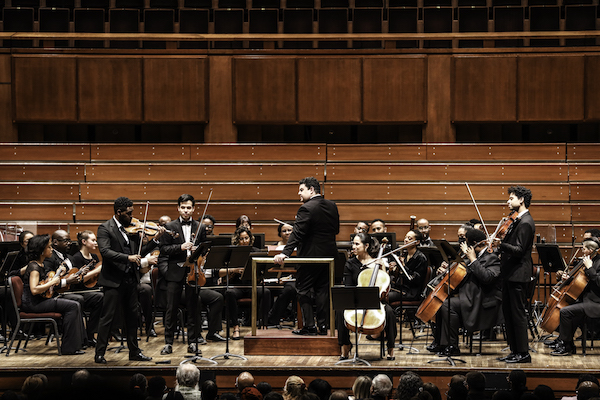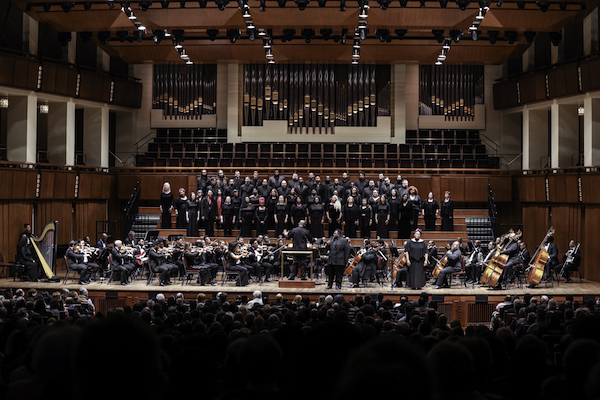Sphinx celebrates 25 years of bringing greater diversity to the concert stage

Tito Muñoz led the Sphinx Symphony Orchestra Tuesday night at the Kennedy Center. Photo: Jati Lindsay.
The Sphinx Organization should have celebrated its silver anniversary in 2021, a milestone finally marked on Tuesday night. Washington Performing Arts and the Kennedy Center co-presented a concert by the group’s premier ensembles in the Concert Hall, to celebrate Sphinx’s aim of increasing the presence of black and Latino performers and composers in the classical music world.
For the evening’s first half, Tito Muñoz, music director of the Phoenix Symphony, led the Sphinx Symphony Orchestra in four works by black composers. They opened with “Motherboxx Connection,” the first movement of Carlos Simon’s Tales: A Folklore Symphony. Commissioned by Sphinx to celebrate its 25th anniversary, the work ended up receiving one of its first performances last March on a program by the National Symphony Orchestra.
Simon, who has been composer-in-residence at the Kennedy Center since 2021, described the movement as a tribute to the Afro-futurism of the artist collective Black Kirby. Bubbling, syncopated rhythmic patterns evoked the Motherboxx, “an all-knowing entity that is aware of the multi-faceted aspects of the Blackness.” The music often pulsates in repeated notes, like distant radio signals from the glockenspiel. Muñoz’s precise gestures kept the work percolating and even.
Samuel Coleridge-Taylor represented the past in his Ballade for Orchestra, an 1898 commission passed to the 23-year-old composer by his mentor, Edward Elgar. In a harmonic and melodic idiom reminiscent of Tchaikovsky’s ballet scores, the score featured a dancing, devilish main theme answered repeatedly by lush strings. The orchestra’s string sound was warm but occasionally not quite unified in rhythm and intonation.
The most capable handling of the orchestra came in Valerie Coleman’s Seven O’Clock Shout, commissioned by the Philadelphia Orchestra and premiered during the Covid year of 2020. Shimmering trumpet solos introduced this initially delicate piece, featuring superb solo work from practically every woodwind instrument. In the final minute, cued by the clanging of a cow bell, the musicians shouted and cheered, an evocation of New Yorkers saluting pandemic healthcare workers in the evening as hospitals switched work shifts.
Sphinx looked backward to its roots in Delights and Dances by Michael Abels, commissioned by the organization for its tenth anniversary. The composer, now known for his scores to the ground-breaking horror films of Jordan Peele, wrote a sort of concerto for string quartet. Taking the solo parts created for the Harlem String Quartet, cellist Christine Lamprea and violist Jordan Bak opened the work in a reflective tone, answered by violinists Rainel Joubert and Rubén Rengel.
As the solo licks became more challenging, tinged by blue notes and bends, the audience easily picked up on the cues in the music, applauding each soloist as it would in a jazz performance. The orchestra, at first accompanying in reserved pizzicato strums, took up the material with its own riffs. A cadenza-like middle movement provided some breathing room, capped by a rollicking hoedown finale.
Eugene Rogers conducted the concert’s second half, combining the orchestra with the Sphinx chorus Exigence and members of the Washington Chorus. The pandemic had forced Rogers, the first black music director of the Washington Chorus, to go virtual for his first concert with that ensemble in 2020.

Eugene Rodgers conducted the choral second half of Sphinx’s concert Tuesday night. Photo: Jati Lindsay
Rogers helped the singers shape a moving, unaccompanied rendition of the traditional spiritual “Fix Me, Jesus,” arranged by Augustus O. Hill. Aundi Marie Moore’s puissant soprano soared from the front of the stage on the solo part. The choir gave Carlos Cordero’s “Holding Our Breath” the same kind of a cappella intensity, with the text by Julie Flanders (“Can you breathe? I can’t breathe”) rendered perhaps too literally in gasping and sounds of exhalation.
Both choirs and orchestra took part in Joel Thompson’s Seven Last Words of the Unarmed. Premiered in 2015, the work sets the “last words of seven African-American men killed by police or authority figures.” As Rogers pointed out in brief remarks, the list of such murders has only grown in America, most recently with the killing of Tyre Nichols in Memphis last month. The piece is powerful, although it undermines its own solemnity with sentimental harmony and some overly direct techniques, like chest thumps depicting gun shots.
As a sort of encore, Rogers directed the collected musicians in his arrangement of “Glory,” the song by John Legend and the rapper Common from the movie Selma. Tenor Lavonté Heard ran away with the vocal solo, adding remarkable Legend-like embellishments to the tune, while another singer, Monique Holmes-Spells, convinced in spoken words contributed by Common. Made in response to the Ferguson protests in 2014, the song lifted the evening toward the hope of a brighter future.
Jacqueline Echols, Justin Austin, and the Griot String Quartet join composer Damien Sneed for a tribute to Marian Anderson and Jessye Norman 7:30 p.m. February 10. washingtonperformingarts.org
